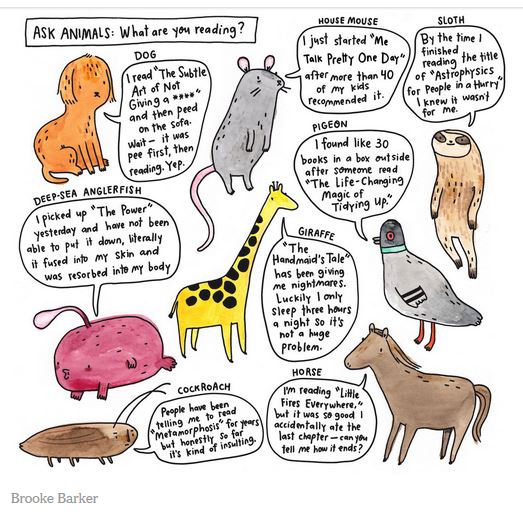Blogging & Musing...
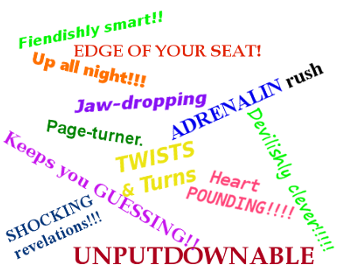 Recognize any of the phrases to the left?
Recognize any of the phrases to the left?
Hard not to. They're taken verbatim from reviews of suspense novels and are repeated over and over in cover blurbs and ads (because, really, how many ways can you say "exciting"?).
Add to that…nearly every thriller gets hailed as "THE NEW GONE GIRL OR THE GIRL ON THE TRAIN!!!!!"
My problem is I've grown tired of heart-thumpers (a phrase not on the list, btw)—of being on the edge of my seat for 384 pages—and reading in PANIC MODE.
So Dear Reader, confession: I skip ahead … to the last couple of pages. I need to see if my favorites make it through intact so that I can just settle back and enjoy the ride. After all, isn't that the point of reading—to savor the words, their rhythms and nuances and to luxuriate in wherever a story happens to take us?
Listen, I LOVE a good thriller—every now and then. But it should come as no surprise that, since Gone Girl, thrillers have been flooding the market. It seems as if the publishing industry has gone mad with its outpouring of beautiful psychopaths.
Worse, even writers of "literary fiction" are adding touches of thrillerdom to jazz up their plots and, I guess, juice up their sales. Oh, well. 'Nuf said.
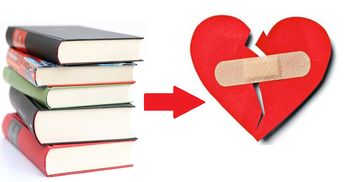 Dear Reader. Maybe it's about time for this post. Like you, I bet, I've been distressed — no, horrified — by the divisiveness and ugliness pervading our public discourse.
Dear Reader. Maybe it's about time for this post. Like you, I bet, I've been distressed — no, horrified — by the divisiveness and ugliness pervading our public discourse.
We've turned against one another: liberals and conservatives, globalists and populists, blacks and whites, men and women, religious and nonreligious, elites and … well, pretty much everyone else.
But here's the good news. We have BOOKS. Novels, especially, are sources of refuge — with the power to heal, to bind wounds and the wounded.
Through book clubs—with our books—we come together to share the love of story. We visit different cultures and are exposed to different ideas. We grow our empathy. We locate ourselves, for a time, in a wider world. We understand — because we are well read — that change is inevitable. But we also understand that there are lasting values which must be protected, always.
Those "lasting values," though, can get us into trouble; how we define them differs, which makes them easy to politicize. You could say the idea of values is what divides us.
But there ARE lasting values, ones we can all agree on. First and foremost is KINDNESS, and we can find it in literature. Many of our favorite books are those in which kindness is found in unexpected places, in which an open, generous spirit prevails over cruelty and selfishness, anger and fear.
A second is belief in the DIGNITY of every individual. That's a hard one. It's much easier to play the lowest card in the deck and resort to name-calling — I know, I've done it. Yes, shamefully, I've indulged in vitriol.
Yet literature is rife with the acknowledgement of human worth — that individuals, no matter how vile or how degraded, possess an inner core of dignity.
Moral to this blog post: Make the world a better place—READ A BOOK. End of sermon.
 By Kathy Aspden, Author *
By Kathy Aspden, Author *
Here’s the thing I love about screenwriting – it’s about using the fewest words to create the largest picture.
There’s a wonderful economy in the language of films. You’re given two hours at best – which translates into 120 pages of script, one page per minute.
I’ve had table readings of my scripts – no action included – and have been surprised to find that it really is one minute per page.
So here’s your mission: Write a scene that doesn’t include the character’s thoughts, desires and complex histories, but somehow conveys a character’s thoughts, desires and complex histories. It’s like a puzzle.
Add to that the fact that somebody important who’s reading your script does not want you to direct them. It sounds confusing, doesn’t it? It is.
RENNIE
I was wrong. You can tear up my contract and keep the money. I’ll take my chances on the outside.
This is a line from my screenplay, A PERFECT WORLD – a dystopic society in 2046 where America is bankrupt from taking care of the sick.
All illness has been traced to HPAS - Hybrid Procreation Autoimmune Syndrome – caused by the cross-pollination of people breeding outside their race of origin: The American Melting Pot. The government has decided it’s time to fix the problem before humanity is too sick to survive.
What if medicine suddenly became illegal and the sick were encouraged to die while America cultivated a new race?
Now picture my dilemma as the screenwriter. Exclamation points are frowned upon. Italics aren’t allowed. Underlined words are not encouraged unless absolutely necessary. Using all caps (ala Christian Gray style) is a complete no-no.
And yet my character, Rennie, is a woman in a government run clinic, who is thirteen-weeks pregnant with a genetically viable child, produced through a government sanctioned union, and she wants out.
She wants out at the top of her lungs. She wants out in spite of the fact that she has signed a contract. She wants out even though she knows that medical care outside of the facility has been deemed illegal.
SHE WANTS OUT!!
But it’s not my call as a writer to do the director’s job (or so they say). So I write the words and hope he/she gets it. Or more likely, I hope the twelve-year-old he/she intern assistant to the producer gets it.
It’s all good, though, as long as YOU get it.
* Kathy Aspden is the author of Baklava, Biscotti, and an Irishman, as well as a book reviewer for LitLovers.
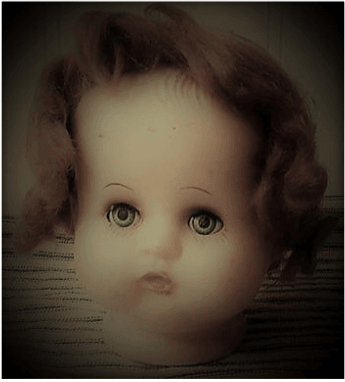
Writing is a lot like making a baby. Sometimes, it takes everything to get to the point of conception, and sometimes you don’t even remember having sex that night, but somehow a baby was conceived. Either way it all begins with a tiny seed that is planted in your heart (or your brain if that’s how you’re wired).
Even before conception, the image of your child is already materializing: "He’ll have my eyes, my husband’s lips, and hopefully not Uncle John’s nose…" In anticipation, a parent is creating a composite baby in their mind. It’s the same for writers. We envision different blends of traits, strengths and weaknesses for our characters.
"Composite Character" is a term I was certain I had invented, right up until I looked it up on Wikipedia. What I found was that I had been intuitively using a process that many writers and filmmakers have done forever - take two or more people from real life or experiences or even history, and meld them into one quirky, interesting person with the capability of being both deeply flawed (as most great characters are) and relatable. It was another case of my inventing something that somebody else had already invented (insert travel hammock, swinging screen door for sliders, the instant ballerina-bun maker).
The strange thing is that I can’t tell if my characters begin to remind me of someone who then creeps into my head as I write, or if there is already a person in my head whose traits have crept into my character. Anyone who knows me may have guessed that there’s probably more people in my head than is considered healthy. Whatever the reason, my characters tend to take on a lot of personality traits – like snowballs down a mountainside — as their stories progress.
I'm more aware of it when I'm writing screenplays. It's easier to have an actor to visualize as the script unfolds. And why wouldn’t an actress like Julianna Moore (with a little Diane Keaton thrown in) want to play the part of Grace Mitchell, a forty-nine-year-old author who has just written a successful self-help book decrying America’s obsession with youth, but stands to lose everything when she finds herself pregnant by a thirty-eight-year-old plastic surgeon? Great plot, right? (An Inconvenient Miracle is available for option if you happen to be a successful movie producer).
Anyway, back to these mixed-up characters of mine. What I came to realize was that my psychiatrist had been wrong; the voices in my head were a good thing. Working with the public, being part of a large family, inheriting a natural love of human interaction from both my mother and my father gave me a lifetime’s worth of crazy, loveable parts and pieces to choose from when writing. This mental/multi-tasking/ADD portion of my brain was finally paying off! On top of that, I found a great app that allowed me to see my combos by physically blending people.
Here’s my JulianneDianeKeatonMoore blend.
P.S. I also invented the first Transformer, the epitome of the composite character — a doll head that turned into a change purse. I didn’t call it a Transformer. I called it a Doll-head Purse.
* Kathy Aspden is the author of Baklava, Biscotti, and an Irishman, as well as a book reviewer for LitLovers.
 Cursive Cramp
Cursive Cramp
By Kathy Aspeden, Author*
A few years ago I took a creative writing class from Professor Patricia McGraw. It was a three-credit course designed for advanced writers.
Absolutely, I wanted to get the most out of the class.
But I also wanted to get an "A" (grade-seeker — a horrible trait leftover from not having achieved anything athletic in my childhood years). That meant doing all the homework, even the things I found redundant or repetitive. Everything.
Professor McGraw was a huge fan of cursive. She said it got our creative juices flowing to engage our hands in what is quickly becoming a medieval practice. Four handwritten lined-notebook pages a night. Ugh!
It was agony for me. I have terrible, scratchy handwriting. My hands do not form circles. I can’t get anything on my body to make a circle. Ankle rolls during yoga, hula hoop hips, all of it is difficult.
I’m not graceful, I’m purposeful. I can hand-draw a window opening without a level. I’m the chick that does all the cut-in for family painting project.
I don’t create circles or graceful arcs. Cursive is filled with pretty swirls of circles!
Can you imagine getting a mediocre grade because of a simple thing like cursive? It felt positively elementary-schoolish — until I got the hang of it. Yes, like most people my brain works faster than my hands. I had to relax my thoughts, which turned out to allow more time for different, additional thoughts. Who knew?
When I realized that Professor McGraw wasn’t looking at the content, I still felt an obligation to do the task justice. One day I wrote four entire pages of potential book titles that all flowed into one another. "The Life We Made – Making The Pie – A Pie in Your Eye – The Eyes Have It – It Happened in the Park – Park Plaza Promise - Promise You’re Not a Psycho – Psycho is Another Name for Different – A Different Desire…"
Once I wrote a grocery list from when I was a kid, "Chef-Boy-Ardee Raviolis, Captain Crunch Cereal, Frosted Pop Tarts, Tang – the choice of astronauts…" You get the picture.
Before class we’d compare notes about how ridiculous our journals were. One guy wrote everything the NHL Hockey commentator said. Another recorded all the commercials while she power-watched back-to-back episodes of Grey’s Anatomy. Still another student detailed every move her cat made — adding extremely funny dialogue in between actions.
We thought we were beating the system, but we had to admit that something was happening. Ideas were being triggered by the action of writing by hand.
Today, cursive is making a comeback.
I recently saw a news show about the Campaign for Cursive’s 2017 contest winners. It was filled with kids who were treating the learning of cursive like a language or an archeological dig. They were cursive powerhouses, proud to have mastered a language that many of their friends didn’t know existed.
I’ll leave you with a great link to Johanna Silver’s 9 Incredible Ways Writing by Hand Benefits Our Bodies and Brains, as well as a look back at all the hoopla New York Yankees star, Alex Rodriquez, generated with his handwritten apology to the fans of baseball.
Kathy Aspden, is the author of Baklava, Biscotti, and an Irishman, as well as a book reviewer for LitLovers.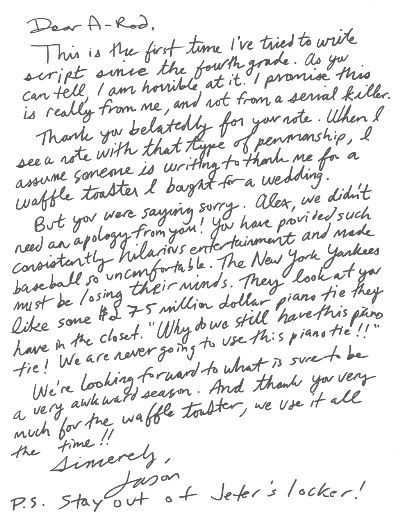


FICTION IS A MAGIC TRICK of sorts. But at its best it doesn’t just conjure up an imaginary world; it makes the real one disappear, it makes the author disappear. Only a book can do this — let you lose yourself so completely. So, if you can, forget about everything else. Just be there with the book.
Jami Attenberg, Author of All Grown Up
Interview, NY Times Book Review, March 26, 2017
And in the other corner . . .


A GREAT OBSTACLE to good education is the inordinate passion prevalent for novels, and the time lost in that reading which should be instructively employed. When this poison infects the mind, …[t]he result is a bloated imagination, sickly judgment and disgust towards all the real businesses of life.
Thomas Jefferson
Letter to Nathaniel Burwell, March 14, 1818
Site by BOOM
![]()
LitLovers © 2024


